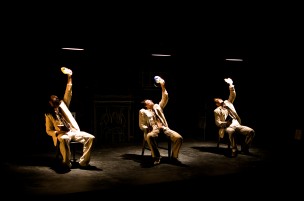
Andrew Ribner/Photography Editor
As many of you are no doubt aware, the week before Thanksgiving break saw the performance of this semester’s Theater Department show, Eugene O’Neill’s little-known play “The Great God Brown.” The show was directed by Associate Professor of Theater Yuriy Kordonskiy, and I had the great good fortune (and honor) to stage manage the show.
The theatrical neophytes among our readers might at this point ask, “Who, or what, is a stage manager, exactly?” Daniel Ionazzi describes the role best when he relays a description a student gave him in his book “The Stage Management Handbook:” “Totally responsible for totally everything.” And that’s more or less true. The stage manager is the person who makes sure that rehearsals are scheduled at times when everyone’s free, and that they start and end (more or less) on time. They call the people who don’t show up to rehearsals on time to make sure stragglers are on their way. They schedule meetings and manage communication with all of the technical and design workers on the team: the small army of people who aren’t the actors, who are never seen, but who are integral to creating the show. In rehearsals they sometimes become stand-in technical consultants, if the appropriate people aren’t there. And eventually, the stage manager is responsible for actually running the show: calling the cues for sound effects and lighting changes, for set pieces to fly in or out, for doors to open or shut. So yes, it is a demanding job.
“The Great God Brown” was particularly demanding, at least compared to shows I have worked on in the past. We rehearsed at least 26 hours a week for around eight weeks. The rehearsals themselves were labor-intensive: actors frequently left feeling like they’d been working out, and Yuriy, Bennett Kirschner ’13 (our excellent Assistant Director), and I sometimes left exhausted as well. Everyone was at every rehearsal; even when Yuriy was away for a week to open a professional show he staged in Romania, we continued to rehearse, working as a team to create new moments. Even when the Great Blackout of 2011 hit, we met in a sunlit room to develop the last bit of that work before he came back. This show consumed my life for the better part of the semester. Yet for all that, I would not trade the experience I had for the world.
So the next time you’re at a theatrical production—here or elsewhere—remember that though the actors are incredible and crucial, every piece of theater is the work of uncountable invisible hands. If it takes a village to raise a child, it takes at least a small army to create theater. And I didn’t feel lost in the sea of people that I was trying to navigate and, ultimately, get moving in roughly the same direction. Quite the opposite. I felt as though I had come home.